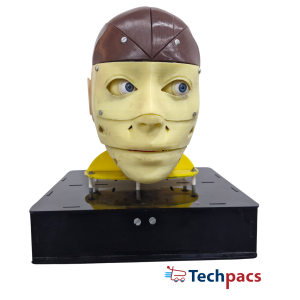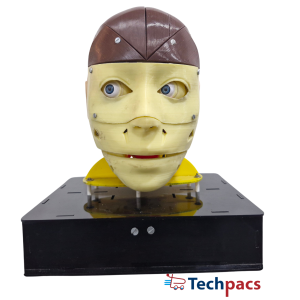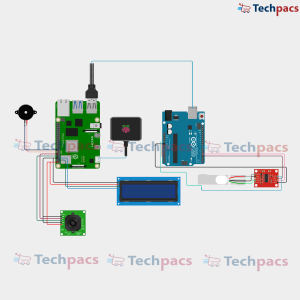Innovative Electric Vehicle Charging and Fault Detection System Using ANFIS-Based Technology
Problem Definition
From the literature review, it is evident that existing systems for detecting charging pile faults in electric vehicles have limitations that hinder their overall performance. One major drawback is the lack of fault diagnosis techniques to identify issues arising from fluctuating current and voltage amplitudes. Additionally, the conventional approach of charging electric vehicles with power from the grid has proven to be inefficient and costly, resulting in increased demand on power grids and higher fuel costs. This highlights the need for a more sustainable and cost-effective solution that utilizes renewable energy resources (RERs) for charging electric vehicle batteries. By addressing these shortcomings and developing a novel method that not only charges EV batteries using RERs but also detects and identifies faults at early stages, the proposed project aims to improve efficiency, reduce costs, and promote environmental sustainability in the field of artificial intelligence and electric vehicle technology.
Objective
The objective of the proposed project is to develop a sustainable and cost-effective solution for charging electric vehicle (EV) batteries by utilizing Renewable Energy Resources (RERs) and implementing an advanced fault detection system. This project aims to address the limitations of existing systems by improving efficiency, reducing costs, and promoting environmental sustainability in the field of artificial intelligence and EV technology. The key goals include efficient EV charging using solar PV panels, early detection of faults through an advanced fault diagnosis system, and ensuring continuous charging even in adverse conditions through a battery backup and switching approach. By integrating solar energy, fuzzy logic-based MPPT algorithm, battery bank, ANFIS fault diagnosis system, and switching circuit, the proposed EV charging system aims to offer a reliable and eco-friendly solution that enhances the safety and longevity of EV batteries.
Proposed Work
In this project, a comprehensive approach is proposed to address the research gap identified in the literature survey regarding the detection of faults in charging piles for electric vehicles. The traditional systems lacked efficient fault diagnosis techniques, leading to performance degradation. To overcome this, a novel method is presented that combines the use of Renewable Energy Resources (RERs) for charging EV batteries with an advanced fault detection system. The proposed model integrates a solar PV system with a fuzzy logic-based Maximum Power Point Tracking (MPPT) algorithm, allowing for efficient EV charging while also incorporating a battery backup and switching approach to ensure continuous charging even in adverse conditions. By utilizing solar energy and a fault diagnosis system (ANFIS), the proposed model aims to offer a cost-effective, eco-friendly, and reliable solution for EV charging.
The proposed work aims to achieve two main goals: efficient EV charging using solar PV panels and early detection of faults through an advanced fault diagnosis system. By implementing a dual-phase approach, the model ensures effective charging of EV batteries by harnessing solar energy during the day and utilizing the battery bank as an alternative power source during nighttime or bad weather conditions. Additionally, a comprehensive fault detection system is integrated into the model, equipped with an alarming mechanism to alert users about any faults detected, such as voltage interruptions or current fluctuations. By combining these components, including the solar PV panel, neuro-fuzzy fault detection system, battery bank, switching circuit, and EV battery, the proposed EV charging system offers a sustainable and reliable solution that not only charges EVs efficiently but also ensures the safety and longevity of the batteries by detecting faults at early stages.
Application Area for Industry
This project can be implemented in various industrial sectors such as transportation, renewable energy, and smart grid systems. In the transportation sector, the proposed solution can be used to charge electric vehicles efficiently and cost-effectively, reducing the reliance on traditional fuel sources. The fault detection system can help prevent damage to the EVs and ensure their smooth operation. In the renewable energy sector, the integration of solar PV panels allows for sustainable charging of EVs using clean energy sources. Additionally, in smart grid systems, the implementation of the proposed model can help in managing the load on power grids and enhancing grid reliability.
Overall, by addressing the challenges of inefficiency and inconvenience in traditional charging systems, this project offers benefits such as cost savings, eco-friendliness, and improved performance in various industrial domains.
Application Area for Academics
The proposed project can enrich academic research, education, and training by providing a comprehensive solution for charging electric vehicles using renewable energy resources while also incorporating a fault detection system. This project offers a practical application of Artificial Intelligence techniques such as Extreme Learning Machine (ELM), Adaptive Neuro-Fuzzy Inference System (ANFIS), and Fuzzy Logic in the field of sustainable transportation.
Researchers in the field of renewable energy, electric vehicles, and artificial intelligence can benefit from the innovative methodology proposed in this project. They can further explore the use of solar PV panels, fault diagnosis systems, and battery banks in charging electric vehicles efficiently and detecting faults at early stages. The code and literature of this project can serve as a valuable resource for Master's and PhD scholars who are looking to delve deeper into the intersection of renewable energy and transportation technology.
By incorporating simulations, data analysis, and innovative research methods, this project can pave the way for advancements in sustainable transportation solutions. It can also open up new avenues for research in the application of AI algorithms for fault detection and renewable energy utilization in educational settings.
The future scope of this project includes expanding the research to include other renewable energy sources, optimizing the fault detection system for real-time applications, and collaborating with industry partners to implement the proposed EV charging methodology on a larger scale. This project holds immense potential for driving forward research in the field of sustainable transportation and enhancing academic knowledge in the domain of AI-driven energy solutions.
Algorithms Used
ELM: The Extreme Learning Machine (ELM) algorithm is used in the proposed EV charging system to effectively convert solar energy into electrical energy for charging electric vehicles. It plays a crucial role in the solar energy conversion process and ensures efficient charging of the EV using the power generated by the PV panel.
ANFIS: The Adaptive Neuro-Fuzzy Inference System (ANFIS) algorithm is employed in the fault detection system of the proposed model. It helps in detecting various faults such as voltage interruption, current fluctuation, and other malfunctions that may occur during the EV charging process. By incorporating ANFIS, the system can accurately identify and alert the user about any potential faults, thereby enhancing the safety and reliability of the EV charging system.
Fuzzy Logic: Fuzzy logic is utilized in the alarming system of the proposed model to produce an appropriate response when faults are detected. It helps in making decisions based on vague and uncertain information, allowing the system to generate an alarming sound when a fault is detected. This feature helps in preventing any mis-happenings or malfunctions of the EV by promptly notifying the user about the detected faults.
Keywords
SEO-optimized keywords: Artificial Intelligence, Charging piles fault detection, Electric vehicles, Fault diagnosis technique, Fluctuating current, Voltage amplitudes, Renewable energy resource, Cost effective charging, Power grids, Eco-friendly charging, RERs, Traditional charging systems, Increase in load demand, Inefficient charging methods, Solar PV panels, ANFIS, Novel approach, Solar energy conversion system, Battery bank, Alternative energy source, Fault detection system, Alarming system, Voltage interruption, Current fluctuation, Mis-happening prevention, EV charging methodology, Solar PV panel, Neuro-fuzzy system, Switching circuit, Energy storage, Continuous charging, Energy efficiency, Maximum Power Point Tracking, Fuzzy Logic, EV Charging, Battery Backup, Energy Conversion, Smart Charging, Energy Management, Fault Diagnosis, Renewable Energy, Electric Vehicle.
SEO Tags
problem definition, artificial intelligence, electric vehicles, charging piles, fault diagnosis, current fluctuation, voltage fluctuation, renewable energy resources, RER, cost effective charging, eco-friendly charging, traditional charging systems, power grids, load demand, fuel cost, inefficient charging methods, battery preservation, proposed work, solar PV panels, ANFIS system, solar energy conversion, electrical energy, battery bank, alternative energy source, fault detection system, alarming system, voltage interruption, current fluctuation, EV malfunctioning, effective EV charging, neuro-fuzzy system, switching circuit, EV battery, reference keywords, maximum power point tracking, MPPT algorithm, fuzzy logic, battery backup, energy storage, continuous charging, energy management, energy conversion, smart charging, energy efficiency, fault diagnosis, renewable energy, electric vehicle.
| Shipping Cost |
|
No reviews found!



















































No comments found for this product. Be the first to comment!